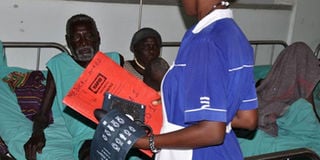Health ministry’s proposed community health extension workers missed a point

Over the past few years, the Ministry of Health has been proposing the creation of a new cadre of health workers - called community health extension workers (CHEWs)- to address our rural health challenges. But recent news that Cabinet has revisited this programme is much welcome as we – a group of health professional students and providers across Uganda – believed this policy would miss the mark by learning the wrong lessons from previous efforts. We now have an opportunity to learn the right lessons, which would involve investing in existing village health teams (VHTs).
Since 2001, VHTs have been a backbone of Uganda’s community-based healthcare model. Selected by the community and trained in prevention and curative health, VHTs are volunteers serving between 25 to 30 households in their own communities. Fifteen years after their operations, the ministry has deemed VHTs “unaccountable” and “unsustainable” due to reported inaction and attrition that in large part, results from their status as unpaid volunteers.
Based on this perceived weakness, the ministry had developed a new programme to place 15,000 ‘community health extension workers’ across the country. The ministry’s strategy had been rooted in the hope that these CHEWs, who will receive lengthy training as well as remuneration – will form a professional and more effective class of service providers.
Yet the proposed CHEW model would suffer from significant limitations. Under the new policy, such workers would have been responsible for entire villages and for far too many households, which would diminish their effectiveness and the accessibility of services for patients.
This programme would also create a new layer of health worker while failing to invest in the existing VHTs that remain better positioned to carry on the necessary work to improve health outcomes. The problem here is not that VHTs on their own have been ineffective; the problem is that the Ministry created the VHTs programme without investing in it.
After initial training, village health workers have received little support. They have received neither remuneration, nor further training or guidance to form cooperatives. In one survey conducted across two districts in Uganda, for example, three quarters of village health teams cited insufficient supplies, transportation difficulties and lack of financial support.
Drawing on successes within Uganda and from countries like Rwanda and Ethiopia, we believe a different path is possible by investing and empowering VHTs. One approach would be to assist VHTs to form cooperatives, which workers could use to generate income to support their work. This model has proved useful in Uganda’s Amuru District, where there is a high rate of retention and service delivery among nearly 400 VHTs.
The creation of a cooperative association there has, for example, enabled VHTs to build partnerships to receive and use motorcycles as transport to reach patients in more distant villages. Another strategy would involve providing multiple incentives and resources, such as health insurance to protect them from impoverishing health expenditures as well as critical goods (such as transportation and mobile phones). Finally, the government could use performance-based payment strategies to directly remunerate health workers or cooperatives.
As medical students and healthcare providers across Uganda, we call on the government to support and empower VHTs.
No strategy will work unless VHTs receive the investment they need. Better health is only possible when those workers closest to communities and households are empowered with the resources they need.
Joan Bisaso
[email protected]




